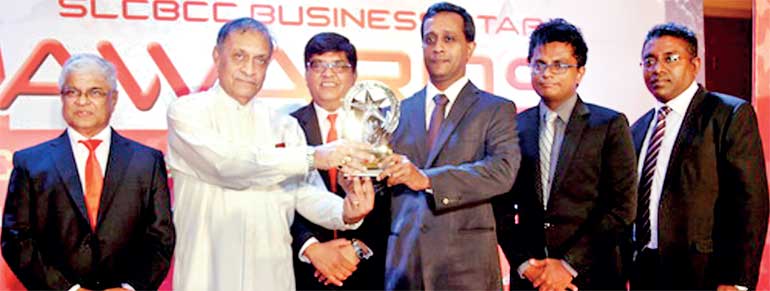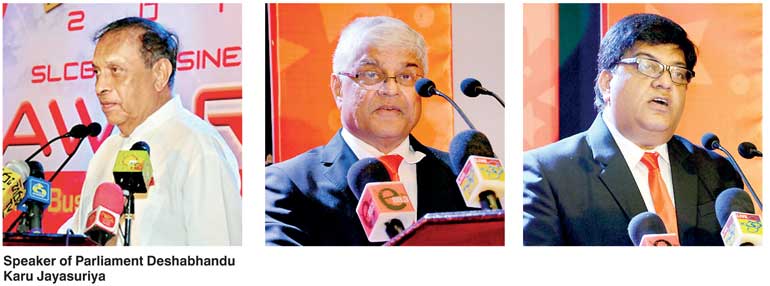Sunday Feb 22, 2026
Sunday Feb 22, 2026
Tuesday, 29 September 2015 01:13 - - {{hitsCtrl.values.hits}}
By Shiran Illanperuma
Trade volume with China is at $ 4 billion as of August and sure to rise well over $ 7 b by the end of 2015, a year-on-year doubling, according to Speaker of Parliament Deshabhandu Karu Jayasuriya.
Addressing the Sri Lanka China Business Cooperation Council (SLCBCC) Awards as Chief Guest, Jayasuriya allayed concerns that the current regime’s diplomatic realignment to India and the West would alienate allegiances forged by the previous regime.
“This Government still looks at China as a very good friend with whom we’ve had relations well before the previous regime,” he asserted.

Though Sri Lanka’s diplomatic and trade ties with China were cemented by the previous regime, Jayasuriya said that the relationship between the island and its East Asian ally go back centuries to the Silk Route. Coming to the modern era, it was D. S. Senanayake who recognised China in 1950 and swiftly sowed the seeds for trade with the Rubber-Rice Pact of 1952, said Jayasuriya.
Jayasuriya also urged the private sector to redouble their efforts and generate wealth for the ambitions of a post-war economy. “It is our job as the Government to facilitate trade by developing infrastructure, however it is up to you in the private sector to generate the wealth we need to grow,” he said.
Meanwhile, renowned Chartered Accountant and Chairman of Judges of the SLCBCC Awards Uditha Palihakkara singled out the worrying gap between exports and imports as an issue for Sri Lankan entrepreneurs to take up if the economy is to be rehabilitated into a healthy growth rate.
“We can see in the last few years that there are many importing companies with fewer exports. We need our local entrepreneurs to innovate and market our raw materials better to foreign countries, especially to pre-existing allies with strong buying power like China,” he said.

Companies that submitted their participation for the awards show had certain prerequisites to fulfil according to Palihakkara. Chief among them of course was the presence of business relations with China. Further criteria considered by the panel of judges included traditional aspects related to business including finance, operations, human resources, technology, investment, marketing and leadership.
“However we prefer to take a holistic approach and look into other aspects such as CSR. Another factor we considered and found deeply lacking was sustainability, that is, whether these businesses could sustain themselves into the future,” said Palihakkara.
A number of businesses that won awards in previous years did not make the cut this time around due to unsustainable business practices Palihakkara alleged. “Some businesses that won a gold star last year have only won bronze this time, or disappeared from the list altogether,” he said.
Sri Lanka China Business Cooperation Council Project Chairman Johnny Fernando expressed hope that the annual awards ceremony, evaluated by a panel of independent judges, would encourage Sri Lankan trade with China. He encouraged even those who did not win any awards to continue in their efforts to engage in trade with the East Asian giant.
Expressing overall pride at the performance of participants at this year’s awards, Sri Lanka China Business Cooperation Council President Emil Kronemberg said that he hoped the awards would continue to foster trade with China while pushing excellence in local business practices.
Pix by Krishan Ranasinghe